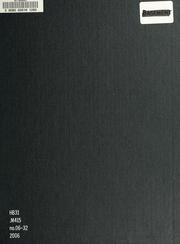Check nearby libraries
Buy this book

Inefficiencies in the bureaucratic organization of the state are often viewed as important factors in retarding economic development. Why certain societies choose or end up with such inefficient organizations has received very little attention, however. In this paper, we present a simple theory of the emergence and persistence of inefficient states. The society consists of rich and poor individuals. The rich are initially in power, but expect to transition to democracy, which will choose redistributive policies. Taxation requires the employment of bureaucrats. We show that, under certain circumstances, by choosing an inefficient state structure, the rich may be able to use patronage and capture democratic politics. This enables them to reduce the amount of redistribution and public good provision in democracy. Moreover, the inefficient state creates its own constituency and tends to persist over time. Intuitively, an inefficient state structure creates more rents for bureaucrats than would an efficient state structure. When the poor come to power in democracy, they will reform the structure of the state to make it more efficient so that higher taxes can be collected at lower cost and with lower rents for bureaucrats.
(cont.) Anticipating this, when the society starts out with an inefficient organization of the state, bureaucrats support the rich, who set lower taxes but also provide rents to bureaucrats. We show that in order to generate enough political support, the coalition of the rich and the bureaucrats may not only choose an inefficient organization of the state, but they may further expand the size of bureaucracy so as to gain additional votes. The model shows that an equilibrium with an inefficient state is more likely to arise when there is greater inequality between the rich and the poor, when bureaucratic rents take intermediate values and when individuals are sufficiently forward-looking. Keywords: bureaucracy, corruption, democracy, patronage politics, political economy, public goods, redistributive politics. JEL Classifications: P16, H11, H26, H41.
Check nearby libraries
Buy this book

Previews available in: English
Places
Developing countries| Edition | Availability |
|---|---|
|
1
Emergence and persistence of inefficient states
2006, Massachusetts Institute of Technology, Dept. of Economics
in English
|
aaaa
Libraries near you:
WorldCat
|
Book Details
Published in
Cambridge, MA
Edition Notes
"November 27, 2006."
Includes bibliographical references (p. 51-56).
Abstract in HTML and working paper for download in PDF available via World Wide Web at the Social Science Research Network.
The Physical Object
ID Numbers
Community Reviews (0)
Feedback?| August 13, 2020 | Edited by MARC Bot | remove fake subjects |
| May 9, 2011 | Created by ImportBot | initial import |










